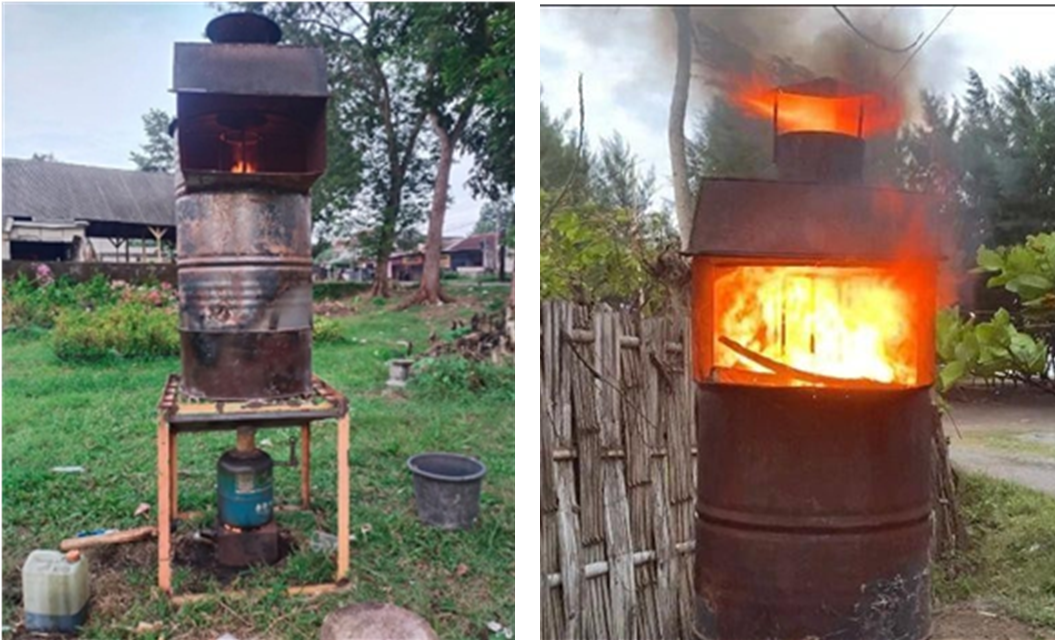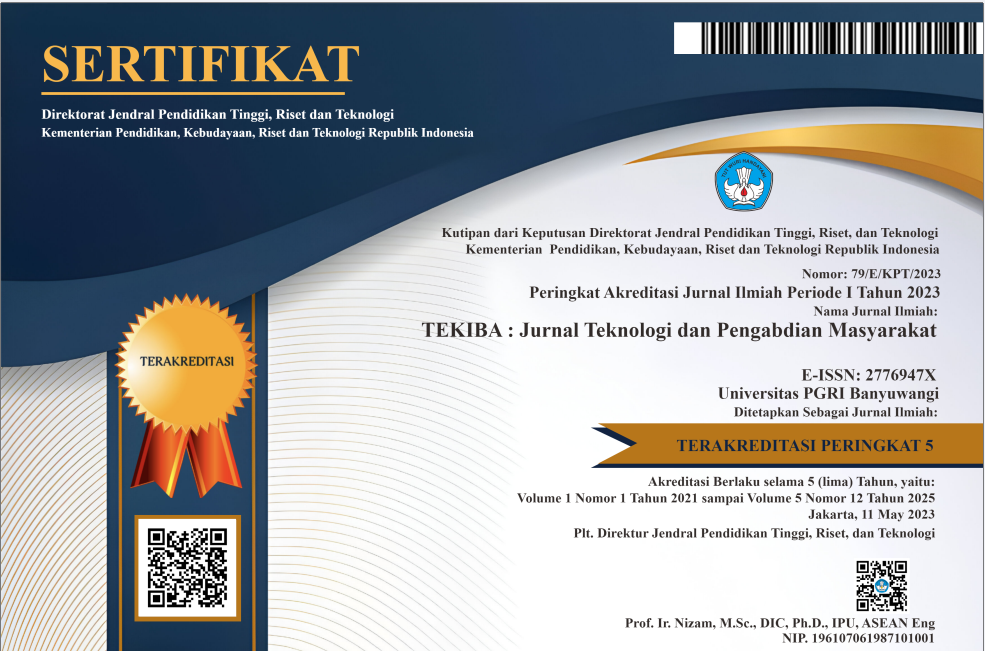Alat Pembakar Sampah Berbahan Oli Bekas Untuk Mengurangi Emisi Gas Buang Dan Residu Pembakaran
DOI:
https://doi.org/10.36526/tekiba.v5i1.5112Keywords:
Garbage Burner, Oil, Gas Emissions, Residue, Alternative FuelsAbstract
The problem of waste and used oil waste is a serious challenge in environmental management. Waste that is not managed properly can pollute the environment, while used oil that is disposed of carelessly has the potential to pollute soil and water. This research aims to design and test a used oil-fueled garbage burner as a solution in reducing environmental impacts. The research method used is the experimental method, which includes designing, manufacturing, and testing the burner. Tests were conducted to measure combustion efficiency, fuel consumption, and exhaust emissions. Data were collected through direct observation and quantitative analysis using a gas analyzer to measure the levels of CO, CO₂, SO₂, NOx, and particulates produced. The results show that this device is able to burn waste more efficiently than conventional methods. The use of used oil as an alternative fuel also helps reduce oil waste that is harmful to the environment. However, although the burner significantly reduced the volume of waste, the exhaust gas analysis showed that improvements in the emission filtering system are still needed to minimize the impact of air pollution. In conclusion, the used oil-fueled waste burner can be an innovative solution in waste and waste oil management, but it needs further development to improve its environmentally friendly aspects. The recommendation of this research is the implementation of an exhaust gas filtration system as well as further testing to adapt the appliance to applicable environmental standards.
References
Julia Lingga L, Yuana M, Aulia Sari N, Nur Syahida H, Sitorus C. Sampah di Indonesia: Tantangan dan Solusi Menuju Perubahan Positif. Innov J Soc Sci Res 2024;4:12235–47.
Ridhuan K, P RA, Ahmad Z. Analisa Kinerja Alat Incenerator Pembakar Sampah Tanpa Asap Yang Ramah Lingkungan. J TURBO 2024;13:287–94. https://doi.org/http://dx.doi.org/10.24127/trb.v13i2.3547.
Estu Broto P, Fitriyanti, Amirin Kusmiran, Khaerul Ihsan. Rancang Bangun Insinerator Pengolahan Sampah dengan Penerapan Teknologi Termal yang Ramah Lingkungan. JFT J Fis Dan Ter 2024;11:19–30. https://doi.org/10.24252/jft.v11i1.45734.
Achmad FYNA. Tantangan Dan Peluang Implementasi Kebijakan Zero Waste Di Kota Baubau. J Publicuho 2024;7:212–23. https://doi.org/10.35817/publicuho.v7i1.348.
Nisah K, Hilman MZ. Pemanfaatan Oli Bekas (Oil Waste) Sebagai Bahan Bakar Alternatif Pada Industri. Amina 2024;6:23–7. https://doi.org/10.22373/amina.v6i1.4347.
Fauzan AH, Najib M, Ardiatma D, Bangsa UP. Pemanfaatan Sampah Plastik Dan Sampah Umum Melalui Refuse-Derived Fuel Sebagai Bahan Bakar Alternatif. Action Res Lit 2025;9:358–65. https://doi.org/https://doi.org/10.46799/arl.v9i2.2818.
Hasbi M, Laome L, Aksar P, Darsono LA. Pemanfaatan Minyak Oli Bekas Sebagai Bahan Bakar Alternatif. Semin. Nas. Teknol. Terap. Inov. dan Rekayasa, 2019, p. 355–60.
Herdito T, Risna, Lutfi M. Pemanfaatan Limbah Oli Bekas Menjadi Bahan Bakar High Speed Diesel (HSD). JST (Jurnal Sains Ter 2021;7:57–62. https://doi.org/10.32487/jst.v7i1.1121.
Kusnadi A, Djafar R, Mustofa M. Pemanfaatan Oli Bekas Sebagai Bahan Bakar Alternatif Kompor Yang Ramah Lingkungan. J Teknol Pertan Gorontalo 2020;5:49–55. https://doi.org/10.30869/jtpg.v5i2.681.
Novitasari D. Pemanfaatan Limbah Oli Sebagai Bahan Bakar Pada Penambalan Ban Motor Solusi Mengurangi Konsumsi Spritus Melalui Metode Destilasi. J IMatematika Dan Lmu Pengetah Alam 2023;1:44–53. https://doi.org/https://doi.org/10.59581/konstanta.v1i1.1134.
Bermotor K, Bengkel DI, Desa W. Gambaran Penanganan Limbah B3 Oli Bekas Kendaraan Bermotor Di Bengkel Wilayah Desa Pasirjambu Kabupaten Bandung. Environ Heal Saf J 2024;1:1–10.
Arif A, Hidayat N, Purwanto W, Setiawan MY, Masykur M. Pengaruh Penggunaan Oli Bekas Sebagai Bahan Bakar Terhadap SFC dan Efisiensi Termal Mesin Diesel. J Mekanova Mek Inov Dan Teknol 2021;7:58. https://doi.org/10.35308/jmkn.v7i1.3730.
Kurniawan MA, Fahmadi AE, Oktopianto Y, Shofiah S. Teknologi Diesel Particulat Filter Sebagai Upaya Mengurangi Emisi Gas Buang Dan Kebisingan Mesin Diesel Kendaraan Niaga. J Keselam Transp Jalan (Indonesian J Road Safety) 2021;8:116–25. https://doi.org/10.46447/ktj.v8i2.350.
Aprilia D, Hardjono H. Penentuan Efisiensi Boiler Dengan Menggunakan Metode Langsung Di Pt X Lumajang. DISTILAT J Teknol Separasi 2023;7:421–6. https://doi.org/10.33795/distilat.v7i2.237.
Aditya D, Ichsan NUR. Analisis Alat Pembakar Sampah Berbahan Bakar Oli Bekas Minyak Jelantah Dan Uap Air. 2023.
Sugiharto A. Perhitungan Efisiensi Boiler Dengan Metode Secara Langsung pada Boiler Pipa Api. Maj Ilm Swara Patra 2020;10:51–7. https://doi.org/10.37525/sp/2020-2/260.
Romianingsih NPW. Waste To Energy in Indonesia: Opportunities and Challenges. J Sustain Soc Eco-Welfare 2023;1:60–9. https://doi.org/10.61511/jssew.v1i1.2023.180.
Pratama A, Basyirun B, Atmojo YW, Ramadhan GW, Hidayat AR. Rancang Bangun Kompor (Burner) Berbahan Bakar Oli Bekas. Mek Maj Ilm Mek 2020;19:95. https://doi.org/10.20961/mekanika.v19i2.42378.
Junaidi J, Kurniawan E, Lasmana A. Analisis Laju Aliran Udara dan Laju Aliran Massa Bahan Bakar Terhadap Beban Pembakaran Sampah pada Incinerator Berbahan Bakar Limbah Oli Bekas. J Engine Energi, Manufaktur, Dan Mater 2021;5:17. https://doi.org/10.30588/jeemm.v5i1.838.
Ayu P, Nasution L, Akbar MAA, Daniar R, Febriana I. Potensi Oli Bekas Sebagai Bahan Bakar Kompor Dapat Ditingkatkan Melalui Proses Pre Treatmeant. J Redoks 2025;10. https://doi.org/10.31851/redoks.v10i1.16637

Downloads
Published
Issue
Section
License
Copyright (c) 2025 Riska Fita Lestari, Ratna Mustika Yasi, Adi Mulyadi, Lutfi Irawan Rahmat, Muhamad Khoirul Anam, Ma’ruf Amin

This work is licensed under a Creative Commons Attribution-ShareAlike 4.0 International License.








